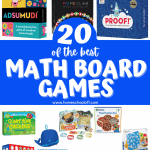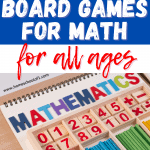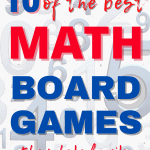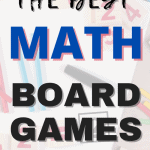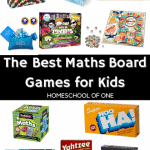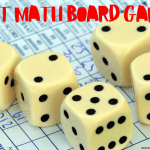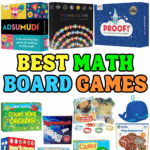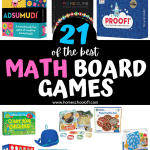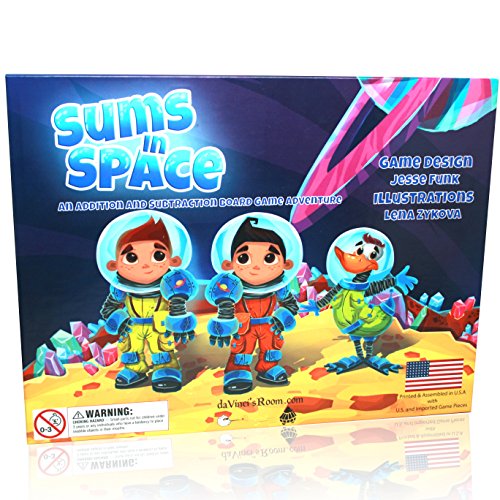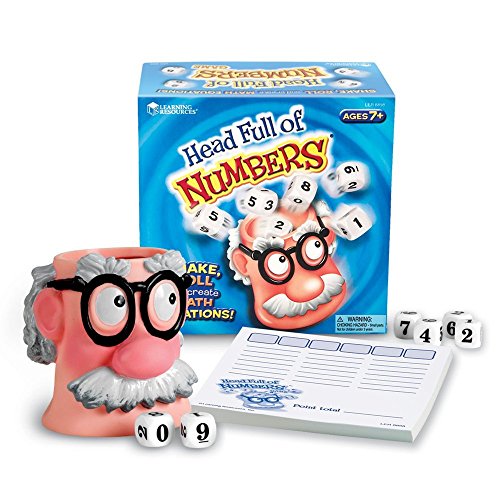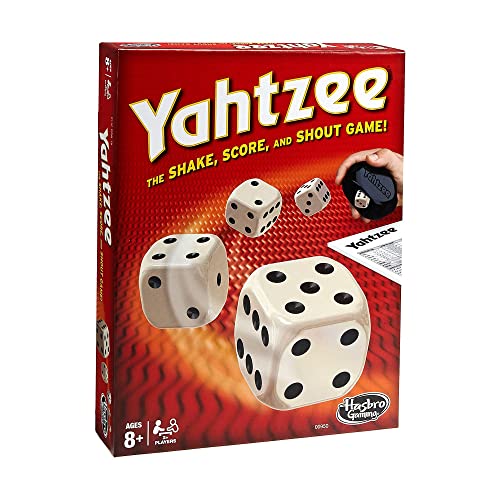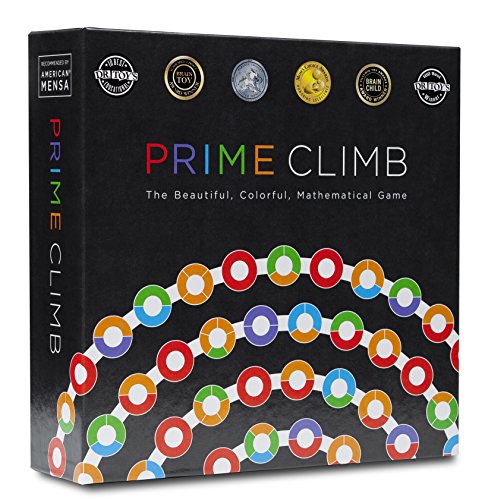21 Best Math Board Games for Kids of All Ages
The best math board games have played a huge role in how we approach learning at home.
They’ve helped us turn tough topics into something fun, build skills without pressure, and create positive associations with math—something I didn’t always have growing up.
We started using board games as a way to reinforce what we were learning, but over time, they became part of our rhythm—whether for a quiet afternoon or a break from worksheets.
This list includes only the games we’ve actually used and loved, from preschool through middle school.

**This post may contain affiliate links. As an Amazon Associate and a participant in other affiliate programs, I earn a commission on qualifying purchases.**
Board Games for Math Skills
Math doesn’t have to come from a workbook to be effective. The top board games for kids are the ones that sneak in learning through fun, repetition, and just enough challenge to keep them coming back.
Whether you’re reinforcing number skills, exploring early operations, or just looking for a smarter way to spend screen-free time, these board games support a wide range of math goals in a way that feels natural.
We’ve used them as part of our regular routine—during school breaks, rainy afternoons, or family game nights—and they’ve made a real difference.
This was one of the very first math games we tried, and it’s such a gentle introduction to counting. The cooperative element made it perfect when my son was younger—we could focus on working together instead of winning or losing. It helped him recognize numbers and understand simple addition without any pressure.
Related: Free math memory game printable
This one was a hit purely because it involves a dog and snacks—what’s not to love? While it feels silly and playful, there’s actually a lot of counting and fine motor work happening. I especially liked how it introduced simple math without it feeling like a “math game.”
Related: Free math bingo cards
If I had to recommend one game to make early math stick, it would be this. We played it so much I could recite the rules in my sleep. It helped with basic addition and subtraction in such a hands-on, repeatable way. Even now, it’s a nostalgic favorite we keep around for younger visitors.
This is one of the best board games for 5 year olds.
This added a fun twist when we wanted something beyond just adding and subtracting. The space theme made it exciting, and it was one of the first times we introduced multiplication and division in a way that didn’t feel overwhelming. It kept my son engaged and gave him a sense of accomplishment when he got it right.
Related: Free space counting worksheets
We used this when we were deep into fantasy books and stories—it made math feel like part of the adventure. The storyline helped hold his attention, and I liked how it encouraged problem-solving beyond just memorizing facts. It felt more like a math puzzle than a typical board game.
This is one of our favorite kindergarten math board games.
This one felt more like a puzzle race, and it really clicked during the early stages of building number fluency. It’s fast-paced and works well for short bursts of math practice without dragging things out. I appreciated that we could adjust the difficulty as he improved.
This was our go-to when we started learning about fractions. It made the concept so much easier to visualize—seeing slices of pizza just clicked in a way that a worksheet never could. We’d play this around lunchtime, and it honestly helped him grasp halves, thirds, and quarters without even realizing he was learning.
Smath reminded me a bit of Scrabble but with numbers, and it really challenged him to think ahead. At first, we played it together so I could help with strategy, but over time he got the hang of making longer equations. It’s a smart game for reinforcing all four operations once the basics are down.
This is one of our favorite math board games for middle schoolers.
This one added a nice dose of friendly competition to our math time. There’s a good mix of strategy and chance, and it worked well for reviewing math facts without it feeling like review. I liked that it wasn’t too repetitive and gave us lots of ways to approach each round.
This isn’t flashy, but it’s been surprisingly useful. We’ve used it for everything from skip counting to number patterns. It’s great for visual learners and worked best when we were focusing on place value or trying to solidify the number sequence beyond 100.
Related: Best homeschool math workbooks.
We gave this a try during a long winter break and it was a decent way to keep math skills fresh. It didn’t hold his attention as long as others, but it was fine for a quick review of basic facts. I think it’s better suited for kids who prefer games that are short and straightforward.
This one was more of a thinking challenge—it took a few rounds to get into it, but once we figured it out, it became a fun mental workout. It’s not flashy or fast-paced, but it’s great for stretching those number muscles in a low-pressure way. We used it on quiet afternoons when he was in the mood for a puzzle.
This is also included in our favorite number board games
We started playing Yahtzee mostly for fun, but I quickly realized how much math was involved—adding up dice, calculating scores, and thinking through probabilities. It’s a great way to sneak in mental math without it feeling like schoolwork. Plus, it’s one of the few games that’s just as fun for adults, so we still pull it out regularly.
This game was a surprise hit. The fast pace and silly concept totally grabbed my son’s attention, and I loved how it helped him practice making ten and adding quickly under pressure. It’s a great pick for kids who need to sharpen money sense but don’t want anything that feels slow or too “educational.”
This is one of the best board games about money.
We all know Monopoly takes forever, but it was honestly worth the time when we were working on real-world math. From budgeting to counting money and making change, it covers so much without needing any formal lesson. We’d play the shorter version during the week, and it still gave us plenty of math practice.
This one was more about logic and sequencing than direct math facts, but it worked really well for number sense and flexible thinking. I liked how it encouraged him to look for patterns and reorganize his pieces—it felt like quiet problem-solving disguised as a game.
Adsumudi ended up being great for building fluency, especially on days when he didn’t feel like doing a full lesson. I liked that we could change the difficulty level depending on what we were working on. It’s fast and light, but still gives a solid math workout.
This one felt like a brain boost. It’s quick to set up and perfect for short bursts of practice—especially for mental math. We used it as a warm-up activity before diving into other schoolwork, and it definitely helped with speed and accuracy.
This game mixes silliness with math in the best way. My son loves pizza, so the theme instantly got his attention. It’s a bit more structured than some card games, but the math is solid—lots of quick thinking and operations practice. Great for kids who enjoy collecting or building things as part of the game.
Proof! is one of those games that really pushes you to think fast. We brought it along on a trip once and ended up playing it way more than expected. It’s competitive but not stressful, and great for reviewing math facts in a more engaging way. Perfect for kids who already have the basics down and want a challenge.
Related: Order of operations board games
This one is a favorite for more advanced math without being overwhelming. I loved how it naturally reinforced concepts like prime numbers and factors without needing to stop and explain too much. It’s colorful, strategic, and definitely a level up from the simpler math games we started with. We still pull it out when we want something a little more thoughtful.
This is one of the best middle school math board games
These math board games have stuck with us over the years because they make learning feel less like a task and more like quality time.
If you’ve been struggling to find a way to make math click, starting with just one of these can really shift the tone of your lessons—or your game nights.
Last Updated on 8 April 2025 by Clare Brown

